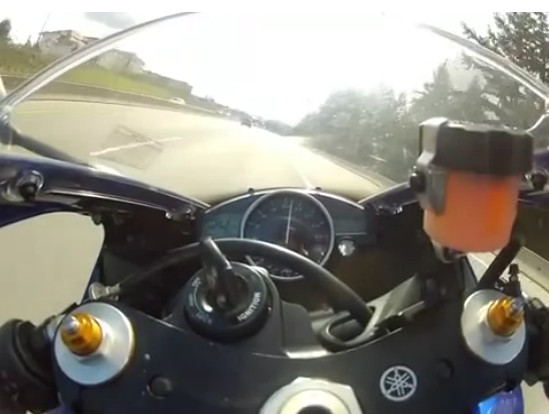As shocking as the video (image above) is, there is so much more to the story that the incident in question. If you aren’t familiar – an unlicensed man took a motorcycle along the Trans-Canada Highway at speeds close to 199km/hr. He filmed it some time in April and then posted it to the above YouTube clip (full CBC news story). The video itself is up to 241,000+ videos at this point. Mercifully, in the video no one was hurt and it appears as though not one was hurt as a result of the incident.
What’s fascinating is that the police used an IP address gathered from an as yet unclear location (possibly subpoenaed from Google?) to tack the video’s uploader and ISP where this video was uploaded from. Based on reports, the action was quite swift:
“Saanich police Sgt. Dean Jantzen says investigators have now identified the IP address where the YouTube video was uploaded, and think they are closing in on the anonymous account holder, so far identified only as Joe Blow.
“The IP address has led to an ISP which is an internet service provider. And from there it does take some steps to sort of drill down a little bit on specifically where it came from,” Jantzen told CBC News on Wednesday morning.”
So, it appears as though the person uploading the video took some steps to remain anonymous – but probably didn’t do any more than create an apparent false account. By calling themselves “Joe Blow” they clearly wanted some level of anonymity. It’s quite interesting how quickly the police were able to get the information they need and use it against this person. There is absolutely no doubt that the nutball here should be investigated, and charged accordingly. Doing what you see in the video is wrong and a on-way ticket to dead town.
The question remains, how reasonable is it for the uploader (who may or may not have been the driver) to expect that their actions stay anonymous? Is it reasonable to the police to “close in” on the location of what is simply identified as a device (and an IP address)? What are the jurisdictional limits when it comes to police using this kind of information?
Update: Recently, I had a great discussion about anonymity with a friend. While the ability to remain anonymous does not appear to legally be a right, there are examples of how we’re given access to being unknown. Here are a couple I came up with:
1. Voting: It is apparently illegal in this country (Canada) and likely the U.S. for the voter’s name to be revealed. Voting tends to be one of the biggest (if not only) anonymous ways to express ourselves in society.
2. Money: Cash has an incredible way of keeping people unknown. If you aren’t identified by fingerprints or some sort fo DNA on the money, there is no other way that currency can be traced back to you. Cash has no paper trail and, incredibly, there is no way for the holder to tell if that $10 bill they carry might have been in the hands of a robber or a priest previously.
Update 2: Interestingly, Gawker runs a story “Why anonymity matters” and enables anonymous commenting on that blog. Interesting arguments in favor of the right to be anonymous.
